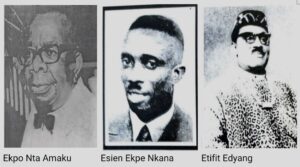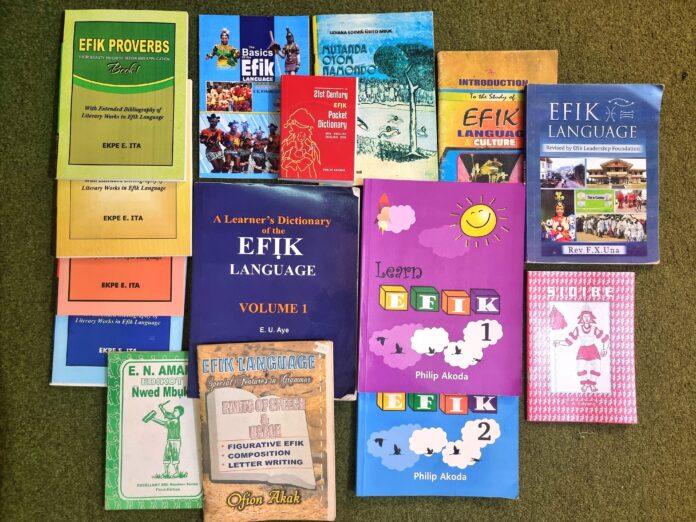Efik literature is a rich and diverse body of written and oral works that emerged from the Efik people of southeastern Nigeria. The Efik people have a long history of cultural and intellectual achievements, and their literature reflects this legacy. The earliest examples of Efik literature can be traced back to the precolonial era, when storytelling, poetry, and songs were used to preserve the history and traditions of the community. These works were transmitted orally from generation to generation and often served as a means of entertainment during communal gatherings.
During the colonial period, the Efik people began to produce written literature in English, the language of the colonizers. This literature was often used as a means of political and social commentary and reflected the growing sense of nationalism and anti-colonialism among the people.
The history of teaching the Efik language in schools can be traced back to the Colonial era, during which the Colonial government sponsored the publication of several Efik publications and made it mandatory for schools in Old Calabar and its surrounding areas to teach the language. From 1930 to 1973, numerous distinguished literary writers emerged in the Efik language scene, including E.N. Amaku, Esien-Ekpe E. Okon, E.E. Nkana, Ernest E. Edyang, Etubom Thomas A. Effiom and others. One of the most notable figures in the advancement of Efik literature was the author Ekpo Nta Amaku. Born in 1898 to the family of Daniel Obiom Amaku and Madam Ekanem Ikpana in Okpo Town, Enion Abatim, his works gained worldwide fame and recognition. His collection includes Inyañ Abasi Ndem, Edikot Ñwed Mbụk, Ekọñ ke Efịk eset, Ñke Ekọñ Abasi, among others. For decades, his most prominent work, “Edikot Ñwed Mbụk”, has been utilized in nursery, primary, and secondary schools.
Numerous contemporary writers have played a crucial role in maintaining the importance of the Efik language in academia, including Chief Efiong Ukpong Aye, Elder Offiong Akak, Mary J. Edet, Engr Ekpe E. Ita, Mr. A. J. Udo-Ema, Chief Nkebem Nkebem, Mr O. A. Akpanyung, Chief Nyong Ekefre, Mr O. E. E. Anwan, Chief Asuquo Otop, Mr Philip Akoda, Mr Kingsley Edet Eyo and others.
Chief Efiong Ukpong Aye, in particular, was a renowned Efik historian who authored various historical works, such as “Old Calabar through the Centuries”, “Efik People”, and “A Learner’s Dictionary of the Efik Language.” The latter publication in particular, is of utmost significance to the study of the Efik language. Although Chief E.U. Aye passed away in 2013, he left a lasting legacy behind him.
Elder Offiong Akak, was the son of Etubom Eyo Okon Akak, a seasoned Efik historian who had written several books focused on Efik language and history. Like his father, Elder Offiong Akak wrote a number of books centred on Efik language including “Traditional presentations of Efik Language”, “Efik Language: Special Features in Grammar”. His books focused on the development of Efik language at the nursery, primary, secondary and university level. He won several awards for his publications, some of which were approved for schools across Calabar.
Another notable author who has contributed to the growth of modern-day Efik literature is Engr Ekpe E. Ita. Born in 1949, Engr Ekpe E. Ita attended the Hope Waddell Training Institution, Calabar. He holds a Bachelor’s degree in Civil Engineering and a Masters’ degree in Highways and Transportation. Engr Ita is also a member of the Obong of Calabar Executive Forum (OCEF). He has authored several books centred around History and the Efik Language, including “Cross River State @ 50 (1967-2017): the people and events that shaped it” and a series of books titled “Efik Proverbs”, which comprise 100 Efik proverbs and their respective interpretations.
Chief Nkebem Nkebem Ebong, hailing from Eniong Abatim, is another notable Efik literary author who has made significant contributions to the advancement of modern Efik literature. Born in 1969, he grew up in Eniong Abatim, the home of E.N. Amaku. Nkebem holds an advanced diploma in Business Administration. He has written several books focusing on Efik history and language. His literary works include Efio-Ekpo, Ebụk Idiọk, Mbụk Nditọ Esịt Edịk, and various other titles.
Women have not been excluded from the halls of Efik literary fame. Several women have contributed to the modern-day relevance of Efik language learning in the classroom. Some of which include Mary J. Edet, Chief Grace Davis, Mrs Theresa E. Nyambi. Mary J. Edet was a renowned writer who wrote the Efik series, “Obufa Edikot Nwed” 1-6; and “Nwed Usem Nnyin”, co-authored with A. J. Udo-Ema. Her books flourished in classrooms from the 1980s. Edet passed away in 2022.
Chief (Mrs.) Grace Nkokom Davis was a prolific writer and poet, with several publications to her name. Born on November 20, 1930, in Obot Etim, Itu in Calabar. Mrs. Davis began her education at the Scottish Mission Primary Schools at Itu Hill and Use lkot Oku, and later attended the Girls Institute at Ikot Obong. She became a Probationary Teacher after completing her post-primary course, and was sponsored by the Scottish Mission Authority for a Teacher Training Course at the Women’s Training College in Umuahia, where she earned the then highly esteemed certificate for Grade l/Higher Elementary Teachers Certificate. She later carried out further studies at the Aggrey Memorial College in Arochukwu, the University of Ibadan, and the University of Nottingham in England, where she earned a Diploma in Early Childhood Education with an emphasis on slow learners and mentally challenged children, and a Diploma in Teaching of English as a second language. She was a member of the Association of Nigerian Authors and her literary works covered a wide range of themes, including cultural preservation, social justice, and women’s empowerment. Her works were featured in many local and international publications, including the Nigeria Magazine, the West African Pilot, the Daily Times, the New Nigerian, and the Nigerian Tribune. Some of her published works include: “Koko” books, volumes 1-5; and Arithmetic for beginners title “Etiti”. Davis Koko series focus on Efik numerals and provide a long list of Efik numerals from 1 – 1,000 and above.
Mrs Therese E. Nyambi (nee Minika Essien Etim Ukpong Offiong) was born in the 1930s in Essien town, Calabar. She had her early education at the convent school, Calabar; Holy Child College, Ikot Ekpene; and WTC Enugu. She later studied at Bath College of Education (Bristol University) in England and the Lagos state University, Ojo, where she obtained her Bachelors and Masters Degrees in Education. Mrs Nyambi was a head teacher in Calabar and Lagos schools. She was the first principal of Abbey College, Lagos and retired as H.O.S. (Co-Curricular) in the then Local Education District, Surulere. Her books include “The culture/ customs of the Efiks”, The Basics of the Efik language” and several others. Mrs Nyambi is particularly known for her contributions to the study of Efik language learning and Efik culture.
Other female authors in the Efik literary scene include Prof. Stella A. Ansa, Iquo B. Asuquo and Prof. Ako O. Essien-Eyo. The aforementioned three wrote the book, “Fọnetịk Efịk: Ñwed Ukpepñkpọ Abañade Mme Uyom Ikọ Efịk”. Several young people have also contributed to the growth of Efik literature and language learning in the classroom. Some of them include Philip Akoda, Ben Nyong Okon, Nsa Charles Bassey and several others.
Born on May 1st, 1996, Mr. Philip Akoda has been a driving force behind modern technological advancements in the Efik language sector. He is an accomplished author with a focus on Efik language and history, having written works such as “Learn Efik” book 1 and book 2; “A 21st Century Efik Pocket Dictionary”; and “Groundwork of Eniong Abatim History (1670-2020)”, the latter was co-authored with his mother, Prof. Winifred Akoda. In addition, Philip has authored numerous Wikipedia pages related to Efik history, language, and culture, including Efik literature, Efik mythology, Efik Language, Efik calendar, Efik name, Efik religion, and several others.
However, Philip’s greatest contribution to Efik language educational technology is the Tete Efik dictionary app. This mobile app, available on the Google Play Store and App Store, is the first of its kind and contains over 14,000 words with features such as audio pronunciation, synonyms, antonyms, definitions, sentence examples, phonemic transcription, history, etymology, and more. Many have lauded the Tete Efik dictionary app as a brilliant innovation.
Another language enthusiast is Mr Ben Nyong Okon. Mr Ben Okon is a lecturer at Arthur Jarvis University, Akpabuyo. He is also a consultant on English words of Efik origin for the Oxford English Dictionary. Through social media, he has advocated for Efik Language by composing relevant and intriguing information on the Efik language. Other Efik language activists, authors and poets of the modern era include, Mr Udo A. U. Usoro, Chief (Mrs) Atim Ekpo Bassey, Chief Nyong Ekefre, Holyns Hogan, Nsa Charles Bassey and several others.
In 2022, The Nigerian Universities Commission approved the study of Efik as a bachelor’s degree programme.
The programme which spans four years includes courses such as Introduction to Efik Traditional Music, Phonology of Efik Language, and Introduction to the History of Efik People, among others. While the program has not yet commenced, it is slated to begin during the next academic session at the University of Calabar.
The Efik language continues to face a number of challenges in the present era, including an increasing rise of second and third generation of non-Efik speakers (L2) of the language which is causing the language to evolve; the lackadaisical attitude of Efik parents toward teaching their children Efik at home; shortage of qualified Efik language teachers, dearth of Efik language textbooks that cover the educational curriculum. Various organizations have made efforts to promote the study of Efik language, including the non-governmental organization, Efik Leadership Foundation (ELF), and the Obong of Calabar Executive Forum (OCEF), an organization affiliated with the Palace of the Obong of Calabar. ELF has been a strong advocate for the Efik language, celebrating its use on Mother Tongue Day and republishing the textbook “Efik Language” written by F.X. Una for use in schools. To encourage students to pursue Efik language programs at the university level, ELF has established a scholarship program. Additionally, OCEF has been providing scholarships to support the study of Efik language for several years, and recipients are recognized at the annual Utoomoobong celebration. OCEF also places much attention on the celebration of UNESCO mother tongue day to enhance the use of the Efik language across the world.
Despite the relatively small number of Efik speakers, the relevance of Efik literature persists through various ongoing efforts.









